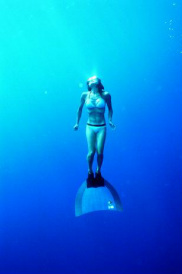\ˈrap-chər\
| Free diving is done without breathing apparatus. Mostly these divers stay near the surface, exploring the kelp for a minute or two, then surfacing for air. The most extreme form of the sport, though, is another thing entirely. It’s also called “competitive apnea” and that’s pretty much what it is: the diver submerges for as long, or as far, or as deep as s/he can on a single breath. Sometimes for minutes at a time. Down to where it’s dark and dangerous. Just the thought of it scares the hell out of me. |
It turns out divers at great depths can have vivid hallucinations, as the nitrogen in their body tissues interferes with their brains in ways still not entirely understood. The result is euphoria, exhilaration, time distortion, confusion, and (eventually) unconsciousness and death. Afflicted divers drift and play in the water until their air runs out.
I learned about the phenomenon as a kid, in my many hours spent riveted to The Undersea World of Jacques Cousteau. I loved everything about that show: the ocean creatures, the ship Calypso, the Zodiac rafts, Cousteau in his red watch cap squinting out over the waves—and especially his gravelly accented voice-overs. His invocation of “ze RAHP-tuure of ze DEEP” was the most terrifyingly enticing thing I’d ever heard.
Rapture of the deep!
Leave it to a Frenchman to come up with such a poetic and evocative phrase. Left to ourselves, we practical Americans would no doubt persist in calling it “nitrogen narcosis.” (Or worse, the “Martini effect”—so called because someone likened the sensation to drinking one martini for every 50 ft of depth beyond the initial 100—a phrase that evokes nothing more exalted than getting sloshed at an ad-man’s lunch.)
| Rapture, though! Rapture can mean ecstasy, joy that sets us outside ourselves. But it also means being snatched up, transported, carried off. There is a lot of violence to the word: it comes from the Latin raptus, which means to tear up or carry away, to abduct—the word that also gives us “rape.” It’s related to modern English “raptor,” meaning a hawk or predatory bird—something that stoops down from above, talons outstretched. |
Except in the last two weeks, three people I know have died very suddenly. I seem to be spending a fair bit of time going to memorial services where we all stand around shaking our heads: “Well I guess he didn’t suffer….” “I saw her last week at the planning meeting.” “God, I’m going to miss him.” They are gone, just like that—leaving only a few widening ripples on the surface. What was it like for them, diving so quickly into not-knowing? Did they see it coming? Could they snatch one last deep breath?
I am no diver. The weight of the water above, the ache in my lungs, the pressure in my ears: the thought of going deliberately into that makes me panicky. I prefer the bright surface of sun and foam and water and air.
And yet, rapture of the deep! It swoops down, talons outstretched, in a blaze of brilliant light. Sharp teeth arcing up from the blue-black shadows below.



 RSS Feed
RSS Feed